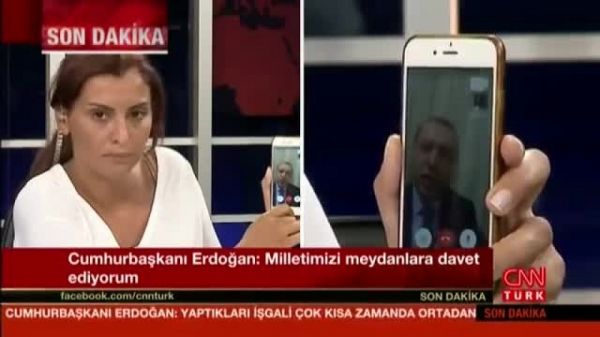Turkish President Recep Tayyip Erdoğan’s address to Turks during a July 15, 2016 coup attempt via a FaceTime conversation with a TV anchor on CNN Türk was not spontaneous but planned, journalist Cevheri Güven has claimed, sparking a debate about the authenticity of Erdoğan’s coup narrative.
On July 15, 2016, as a coup was underway in Turkey, President Erdoğan made an unexpected FaceTime call to Hande Fırat, CNN Türk’s Ankara bureau chief and TV anchor, calling on his supporters to resist the coup plotters.
Erdoğan’s televised conversation changed the course of events as hundreds of thousands of civilians took to the streets to oppose several thousand soldiers posted at critical locations in İstanbul and Ankara.
Fırat later recounted the call in an interview with Euronews in 2017 as the country marked the first anniversary of the botched coup, saying it all happened spontaneously.
Güven, a German-based Turkish journalist who has gained a large following on YouTube with his investigative reports on Turkish government corruption, released a video on Sunday claiming Firat’s story that Erdogan called her in the heat of the moment was a hoax and that the call was planned a day before the coup attempt.
The news rocked Turkey and sparked controversy over the call and the government’s coup narrative in general.
July 15 coup
On the night of July 15, 2016, Turkey saw a military coup attempt that many believe was a false-flag coup aimed at consolidating President Erdoğan’s authoritarian rule by rooting out dissidents and eliminating powerful actors such as the military in his quest for absolute power.
The failed coup killed 251 people and injured more than a thousand others. After announcing the next morning that the coup had been crushed, the Turkish government immediately began a sweeping purge of military officers, judges, police, teachers and other state employees, ultimately leading to the dismissal of more than 130,000 civil servants and nearly 30,000 members of the military.
On the night of the failed coup, President Erdoğan immediately blamed the Gülen movement for the attempt. He has targeted followers of the movement, a faith-based group inspired by Turkish cleric Fethullah Gülen, since the Dec. 17-25, 2013 corruption investigations involving then-prime minister Erdoğan, his family members and his inner circle.
Erdoğan, who dismissed the investigation as a Gülenist coup and a conspiracy against his government, labeled the movement a terrorist organization and began targeting its members. He jailed thousands, including many prosecutors, judges and police officers involved in the investigation as well as journalists who reported on it.
After the coup attempt, Erdoğan stepped up the crackdown on the movement. Gülen and the movement strongly deny involvement in the failed coup or in any terrorist activities.
Cracks in the government’s account of the coup attempt
Many questions remain about the events leading up to and following the coup attempt.
A parliamentary inquiry committee abruptly halted its work on a report on the coup attempt when Erdoğan expressed disapproval of the deepening investigation.
In July 2021 Selçuk Özdağ, the committee’s deputy chairman at the time, said Turkish authorities had refrained from publishing the investigation’s findings after a legal opinion warned that the report could help members of the Gülen movement with future legal claims for compensation.
Then-Chief of General Staff Gen. Hulusi Akar and the head of the National Intelligence Organization (MİT), Hakan Fidan, did not appear before the parliamentary committee and did not testify in court during the coup trials.
A major in the Turkish Armed Forces (TSK) testified in court that he personally informed the MİT at 2:30 p.m., about seven hours before the coup attempt began.
Why MİT chief Fidan did not inform President Erdoğan or then-prime minister Binali Yıldırım during those seven hours, despite learning of the coup attempt at 2:30 p.m., is one of the questions that remain.
It was also revealed in 2017 that Chief of General Staff Akar and MİT chief Fidan had a six-hour meeting in Ankara the day before the failed coup attempt.
Despite the apparent failure of Turkish intelligence to gather information about the coup plans, no intelligence officer has resigned or been fired by the government. Akar was also not dismissed and became defense minister after retirement.
Erdoğan on FaceTime
Erdoğan’s call to Fırat, which she describes as spontaneous, seems to suggest that the president was under pressure and had great difficulty accessing the networks, even though dozens of media outlets were available to him at all times.
In the video Güven released on Sunday, he said Firat met with MİT’s press adviser Nuh Yılmaz on July 14, the day before the failed coup, possibly to coordinate the plan to connect Erdoğan to the TV network.
Güven also pointed to the fact that while Erdoğan was still on the phone and his video was being transmitted to the network via Fırat’s cell phone in front of running cameras, an incoming call from Yılmaz was displayed on her iPhone screen for 10 seconds. It took some time for Firat to figure out what to do before she pressed the reject button to remove Yilmaz’s name from the screen and bring Erdoğan’s image back to the foreground.
According to Güven, the gaps in Firat’s story are not limited to her contact with the MİT agent.
Media mogul Aydın Doğan, Firat’s boss at the time, contradicted her claim on Nov. 13, 2016 that the Turkish president’s FaceTime call was spontaneous. Doğan said Fırat had told him about the possibility of a connection with the president on the night of the coup attempt, confirming prior knowledge. He told her he would reward her success by covering the cost of her wedding reception and buying her an apartment if she managed the call with success on live TV.
Güven’s claim reinforced the belief of many in Turkey that Erdoğan knew about the coup attempt or was part of the group that planned it, as he sought a pretext to crack down on the Gülen movement and his critics and consolidate his one-man rule.
Fırat defends herself against the allegations
In a series of tweets she posted Tuesday, Fırat defended her contact with MİT press adviser Yilmaz, saying it was normal for her as a journalist to have contact with MİT or military members and accused the Gülen group of trying to discredit her for her contact with the president on the night of the coup.
Fırat also took aim at Berna Laçin, a prominent Turkish actress who retweeted a news post based on Güven’s video.
Nihal Olçok, whose husband, ruling Justice and Development Party (AKP) publicist Erol Olçok, and son Abdullah Olçok were killed during the failed 2016 coup, also joined the debate, asking how Doğan and Fırat could have been calm enough to discuss wedding preparations while a coup was underway.
In February of this year, Olçok said in a live broadcast on the pro-opposition channel Halk TV that her son Abdullah was killed to keep the government’s story about the July 15 coup attempt intact as she believed his testimony would harm the official narrative.
Turkish authorities have been unable to solve the death of the father and son for the past six years.
Although both Gülen and the members of his group strongly deny any involvement in the abortive putsch or any terrorist activity, Erdoğan initiated a widespread purge aimed at cleansing sympathizers of the movement from within state institutions, dehumanizing its popular figures and putting them in custody.
A total of 332,467 people have been detained and 101,305 arrested in operations against supporters of the Gülen movement since the coup attempt, Turkey’s Interior Minister Süleyman Soylu said on June 30.
Source: Turkish Minute



